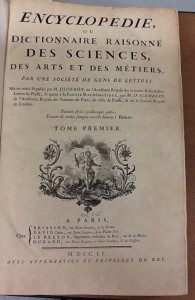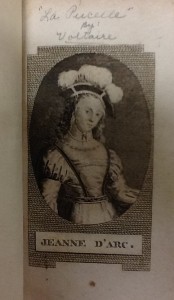By: Amy Chen, CLIR Postdoctoral Fellow
In honor of Bastille Day, this week Cool@Hoole will provide readers with a three-part overview of the Division of Special Collection’s French holdings. Early modern books were covered on Monday and, on Friday, our series will wrap up with a discussion of French Revolutionary pamphlets.
The French Enlightenment was a cultural movement in the seventeenth and eighteenth century in Europe that eventually spread and influenced the development of the United States. The Enlightenment attempted to reform society using reason instead of tradition and faith. Notably, it promoted science, skepticism, democracy, and the separation of church and state. Significant writers from the period included Voltaire and Denis Diderot.
Voltaire
Francois-Marie Arouet, known as Voltaire, lived from 1694-1778. Voltaire, an anagram of his surname and the word “the young,” adopted this name to distance himself from his family and his past — however, Voltaire was only the most famous of pen names. In total, he used 178 different noms de plume while writing across numerous genres. His first play, Œdipe (1718), gave him a national reputation; he wrote it while imprisoned in the Bastille. Voltaire then spent two years in Britain; while there, he began to admire England’s constitutional monarchy and their greater support for free speech. The book he eventually composed on the topic of England’s superior government, Philosophical Letters (1778), was burnt. Over his life, Voltaire’s repeated confrontation with civil and religious authorities made him a role model for revolutionaries. Pictured here is his Pucelle, or the maid of Orleans (1796), an epic poem about Joan of Arc.

Encyclopédie, ou dictionnaire raisonné des sciences, des arts et des métiers (1751), Hoole Library Rare Books AE25.E53 v.1
Denis Diderot
Denis Diderot was a French art critic, philosopher, and writer who lived from 1713-1784. He created the Encyclopédie, ou dictionnaire raisonné des sciences, des arts et des métiers (Encyclopedia or a Systematic Dictionary of the Sciences, Arts, and Crafts) with Jean le Rond d’Alembert, a French mathematician, physicist, philosopher, and music theorist. The Encyclopédie was published in seventeen volumes between the years of 1751 and 1772 and contained 74,000 articles by over 130 contributors. In it, Diderot presented work which laid the ground for studies of consumerism, natural selection, theatrical history, and the concept of free will. Together, the volumes of the Encyclopédie provided the foundation for the French Enlightenment. However, the Encyclopédie was not without controversy: religious censorship led the Encyclopédie‘s printer to strike passages deemed problematic.

